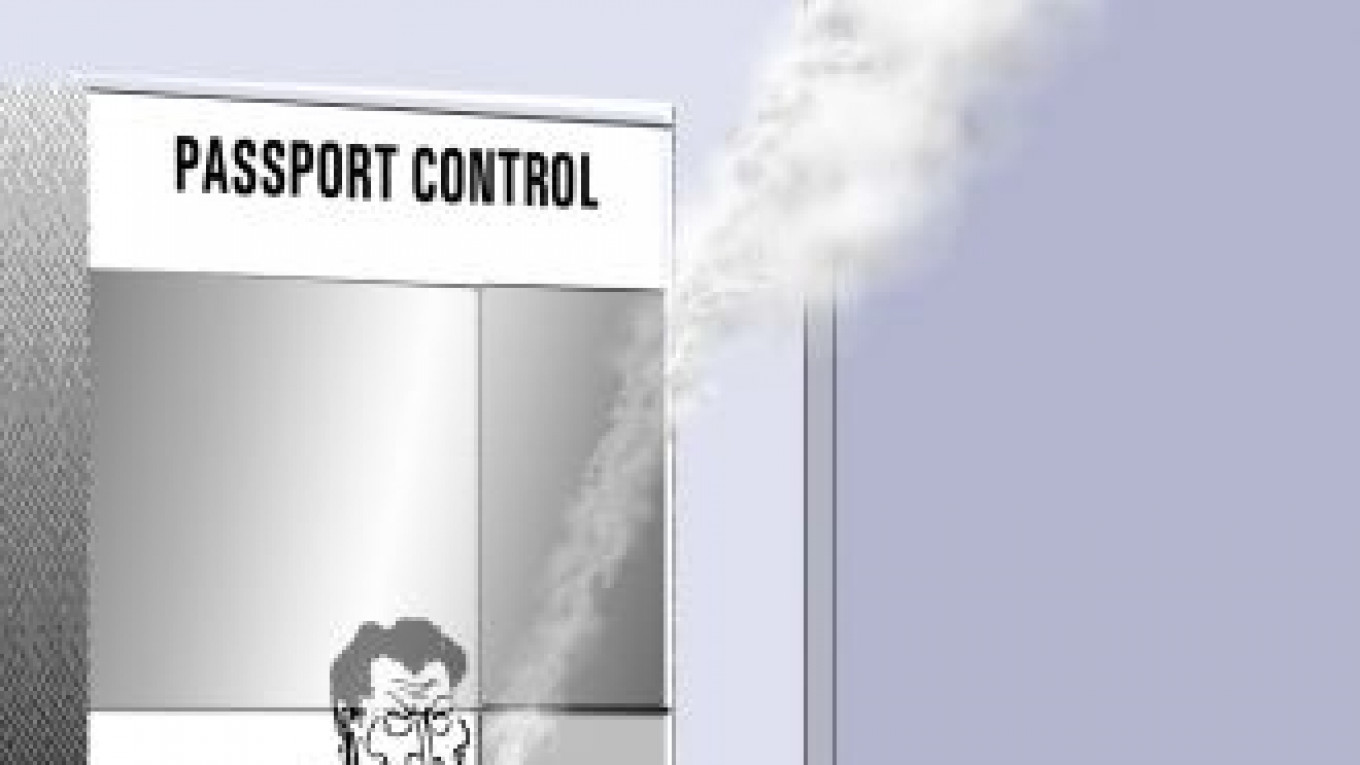The Luke Harding drama turned out to be largely much ado about nothing. He returned to Moscow on Feb. 13, a week after his visa was summarily annulled at Domodedovo Airport, and he was put on the next flight back to London. Nonetheless, the incident tells us a lot about the Soviet mentality and incompetence of the Federal Security Service, which was ostensibly responsible for putting Harding on their “black list” and giving the orders to deport him because of his critical articles about Russia.
The agency’s siege mentality has changed little since the Soviet times when any criticism by foreign journalists of the Soviet system was, by definition, “libel.”
The whole episode resembled a Gogol comedy. FSB agents played the role of bumbling bureaucrats who clearly barked up the wrong tree. At least when they deported Natalya Morar, the investigative journalist for New Times who uncovered new facts about the Kremlin’s slush fund for political parties, there was some logic, albeit from a KGB perspective. But Harding’s deportation left everyone scratching their heads since his articles were not any more critical than what most other Russia-based foreign journalists have been writing about for the past decade.
The other Gogolian moment is that they picked the worst possible moment to annul his visa — a week before Foreign Minister Sergei Lavrov’s meeting with British Foreign Minister William Hague. The Foreign Ministry was given the responsibility to manage the crisis and limit the damage caused by the FSB’s major flub, and it deserves kudos for doing it quickly and effectively.
What can explain the FSB’s zealousness in this case? There is a rich tradition in Russian bureaucracy called ugadat-ugodit — trying to please your boss by guessing what he wants. We saw it in the fall when overly eager bureaucrats started bulldozing kiosks in Moscow hoping that it would please the just-appointed mayor, Sergei Sobyanin. (It didn’t.)
One of the most famous cases in Russian history of this phenomenon was when bureaucrats wanted to show Nikita Khrushchev how eager they were to fulfill his order to grow corn “everywhere” that they even tried to do it in the country’s polar regions.
Likewise, perhaps “Operation Harding” was an attempt by overzealous FSB agents who wanted to prove to their bosses how vigilant they were in defending the motherland against “saboteurs and libelers.”
It may also have been an FSB attempt to deflect attention away from the agency’s numerous failures in preventing terrorist attacks, including the Jan. 24 attack at Domodedovo Airport. If the FSB can’t catch Doku Umarov, the reputed leader of the radical Islamist movement who has claimed responsibility for many terrorist attacks, at least they can go after a prim, Oxford-educated British journalist — a fierce, barbaric enemy of the Russian people if there ever was one.
Perhaps the most ludicrous aspect of the whole affair was when Kremlin-friendly commentators floated the idea that Harding may have been a spy, a throwback to the spy mania of the Soviet period when all foreign journalists were suspected of being likely covers for CIA operatives. But what country allows a spy to come back a week after he has been kicked out?
In the end, the Harding Affair had little to do with Harding — they could have easily targeted any other foreign journalist who wrote critically of Russia — and everything to do with the primitive, Cold War-era mentality of the FSB. It is highly disturbing that, 20 years after the Soviet collapse, when the FSB doesn’t like what a foreign journalist writes about Russia — and can’t refute it in any way — the agency’s only response is a patently Stalinist one: No person, no problem.
A Message from The Moscow Times:
Dear readers,
We are facing unprecedented challenges. Russia's Prosecutor General's Office has designated The Moscow Times as an "undesirable" organization, criminalizing our work and putting our staff at risk of prosecution. This follows our earlier unjust labeling as a "foreign agent."
These actions are direct attempts to silence independent journalism in Russia. The authorities claim our work "discredits the decisions of the Russian leadership." We see things differently: we strive to provide accurate, unbiased reporting on Russia.
We, the journalists of The Moscow Times, refuse to be silenced. But to continue our work, we need your help.
Your support, no matter how small, makes a world of difference. If you can, please support us monthly starting from just $2. It's quick to set up, and every contribution makes a significant impact.
By supporting The Moscow Times, you're defending open, independent journalism in the face of repression. Thank you for standing with us.
Remind me later.






